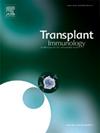抗hla抗体在活体相关肾移植受者中的流行:一项来自印度三级医疗保健中心的回顾性观察研究。
IF 1.4
4区 医学
Q4 IMMUNOLOGY
引用次数: 0
摘要
目的:hla抗体的检测对移植前组织相容性检测、供体选择和移植物存活至关重要。本研究的目的是评估来自印度北部最大的移植中心之一的活体相关肾移植受者的抗hla抗体谱。方法:本研究采用GraphPad Prism 9 Version 9.2.0 (La Jolla, CA, USA)软件对近四年移植检查的回顾性资料进行分析。所有接受移植前检查的样本,如果筛选结果呈阳性,则进行Luminex单抗原珠(L-SAB)测定。在L-SAB上鉴定的抗体被评估其特异性和平均荧光强度(MFI)的强度。结果:共纳入1250例肾移植标本进行分析。其中458份(36.64 %)样本在筛选试验算法中发现阳性。采用Luminex单抗原珠(L-SAB)法对458份样品进行I类和II类HLA抗体分析。在本研究中,我们发现anti-A*24:01、anti-B*15:01和anti-C*07*01是针对hla I类抗原最常见的3种hla抗体。而anti-DRB1*11:01、anti-DQA1*05:01-DQB1*03:01和anti-DPA1*02:01-DPB1*17:01是针对hla II类抗原最常见的抗hla抗体。此外,我们的研究发现抗hla I类抗体与妊娠史之间存在显著关联。然而,在再次移植病例中,我们观察到存在针对HLA I类和II类抗原的抗体。结论:对于移植中心来说,全面了解HLA抗体的流行、MFI及其与各种致敏事件的关系是至关重要的。本研究可以极大地帮助移植社区在活体相关肾移植中选择合适的潜在器官供体、规划脱敏制度、管理受者护理和预测移植结果。本文章由计算机程序翻译,如有差异,请以英文原文为准。
Prevalence of anti-HLA antibodies among live related renal transplant recipients: A retrospective observational study from a tertiary healthcare Center in India
Aim
Detection of anti-HLA antibodies is crucial for pre-transplant histocompatibility testing, donor selection, and graft survival. The aim of this study was to evaluate the spectrum of anti-HLA antibodies among live related renal transplant recipients from one of the largest transplant centers in north India.
Methods
In this study, retrospective data of transplant workup done in past four years were analyzed using GraphPad Prism 9 Version 9.2.0 (La Jolla, CA, USA). All samples received for pre-transplant work-up if showed positive screening results underwent Luminex single antigen bead (L-SAB) assay. Antibodies identified on L-SAB were evaluated for their specificity and the strength of their mean florescence intensity (MFI).
Results
A total of 1250 renal transplant samples were included for analysis. Out of these, 458 (36.64 %) samples were found positive in screening tests algorithm. All 458 samples were further analyzed for both class I and class II HLA antibodies by Luminex single antigen bead (L-SAB) assay. In this study, we observed that anti-A*24:01, anti-B*15:01 and anti-C*07*01 were the three most prevalent anti-HLA antibodies identified against HLA-class I antigens. However, anti-DRB1*11:01, anti-DQA1*05:01-DQB1*03:01 and anti-DPA1*02:01-DPB1*17:01 were the most common anti-HLA antibodies identified against HLA-class II antigen. Furthermore, our study found a significant association between anti-HLA class I antibody and the history of pregnancy. However, in re-transplant cases, we observed the presence of antibodies both against HLA class I and II antigens.
Conclusion
For a transplant center, it is of utmost importance to have comprehensive knowledge about the prevalence of HLA antibodies, their MFI, and their association with various sensitization events. This study may immensely help transplant communities in selecting appropriate prospective organ donors, planning desensitization regimes, managing recipients' care and predicting transplant outcomes in live related renal transplantation.
求助全文
通过发布文献求助,成功后即可免费获取论文全文。
去求助
来源期刊

Transplant immunology
医学-免疫学
CiteScore
2.10
自引率
13.30%
发文量
198
审稿时长
48 days
期刊介绍:
Transplant Immunology will publish up-to-date information on all aspects of the broad field it encompasses. The journal will be directed at (basic) scientists, tissue typers, transplant physicians and surgeons, and research and data on all immunological aspects of organ-, tissue- and (haematopoietic) stem cell transplantation are of potential interest to the readers of Transplant Immunology. Original papers, Review articles and Hypotheses will be considered for publication and submitted manuscripts will be rapidly peer-reviewed and published. They will be judged on the basis of scientific merit, originality, timeliness and quality.
 求助内容:
求助内容: 应助结果提醒方式:
应助结果提醒方式:


